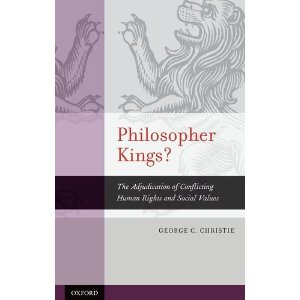April 28, 2011
Private: The Conflict between Freedom of Speech and Other Rights and Values
Snyder v. Phelps

By George C. Christie, James B. Duke Professor of Law, Duke University School of Law
In Europe, speech involving matters that are not generally known, even if the speech concerns events that took place in an area open to public view, has been successfully challenged as an invasion of privacy if the defendant was unable to show that the speech in question concerned a matter of legitimate public interest or contributed “to a debate of general interest to society.” What speech meets these criteria is for the courts to determine. That the public may have a great interest in the subject matter involved in the challenged speech is not by itself enough. Whether courts actually have the capacity to decide on their own what is a matter of "legitimate" public interest is one of the major themes discussed in my new book Philosopher Kings? The Adjudication of Conflicting Human Rights and Social Values."
In the United States, the balance is tilted the other way since freedom of speech is the preferred value. Recent developments, however, contain a hint that a court-administered regime of what is acceptable speech has some support in the United States as well. In Snyder v. Phelps, the United States Supreme Court, quite properly in my judgment, upheld the right of members of the Westboro Baptist Church to picket near the funeral of a Marine killed in Iraq. The signs they displayed to express their contempt for the military’s tolerance of homosexuality were certainly vulgar and offensive, but Chief Justice Roberts, writing for the Court, declared that the issue involved was a matter of public concern and thus protected by the First Amendment.
Many American observers, however, have preferred the approach taken in the dissenting opinion of Justice Alito, who expressed the view that, if the plaintiff could show that he suffered severe emotional distress because of the grossly tasteless signs displayed by the demonstrators, the plaintiff should be able to recover under the common law tort of intentional infliction of emotional distress. Indeed, the approach taken by Chief Justice Roberts leaves open the possibility that vulgar hateful speech on matters that a court determines do not concern a matter of public concern is actionable. That suggests the possible adoption of something like the method used in Europe to decide conflicts between speech and privacy. Under the European approach, a court must balance the value of the challenged speech against the value of the other interests involved in the case before the court. These other interests can range from the desire of the plaintiff to preserve his anonymity to the judicially determined legitimacy of the public interest in the subject matter of the speech in question.
I disagree. In Europe, the rights of speech and privacy, and plausibly by ready analogy the right to be protected against emotional distress caused by offensive speech, are of equal value. That is not the law in the United States, where freedom of expression is the preferred value. Precedents cited by Justice Breyer in his concurring opinion in Snyder and by Justice Alito in his dissent, such as the exception for fighting words recognized in the 1942 case of Chaplinsky v. New Hampshire, seem clearly inapposite. Does anyone really believe that the Court would now hold that calling a law enforcement officer a “God damned racketeer” and a “damned Fascist” – the speech involved in Chaplinsky – could be criminally punished? More to the point, who are judges to decide what information is newsworthy or what speech concerns matters of public concern? Are we to return to a regime of censorship based on notions of good taste? Blasphemous expression directed at Christians, Jews or Muslims can clearly cause emotional distress and is often clearly gratuitous. Society itself has ways of dealing with these situations. Are these now also to be punished by the state or, if directed against specific individuals, be grounds for an action for the intentional invasion of emotional distress by gross and outrageous behavior?
In my book, I question whether judges should want to play the role of philosopher kings. In a nation that is increasingly becoming more heterogeneous, any attempt by courts to impose a minimum standard of politeness for public discourse will almost inevitably result in the imposition by an elite of their own notions of civility on society at large.
Constitutional Interpretation, First Amendment, Individual liberties, Supreme Court




